Essay on Professional Values and Ethics in Nursing Practice NUR5065
VerifiedAdded on 2023/06/03
|12
|3368
|70
Essay
AI Summary
This essay provides a comprehensive analysis of professional values in nursing practice, focusing on key aspects such as patient dignity, collaborative care, empowerment, and the legal and ethical frameworks that govern nursing conduct. The paper begins by defining nursing care and analyzing the concept of dignity, using a case study to illustrate potential challenges in old-age situations like dementia. It then discusses nursing interventions aimed at reducing breaches of dignity and explores the concepts of collaborative care and empowerment, examining their impact on healthcare providers and patient cooperation. Furthermore, the essay delves into cases of disempowerment within healthcare systems and analyzes relevant legal frameworks and ethical principles, including the Human Rights Act and its implications for patient care. The essay concludes by emphasizing the importance of balancing professional values with legal requirements to ensure ethical and effective nursing practice.
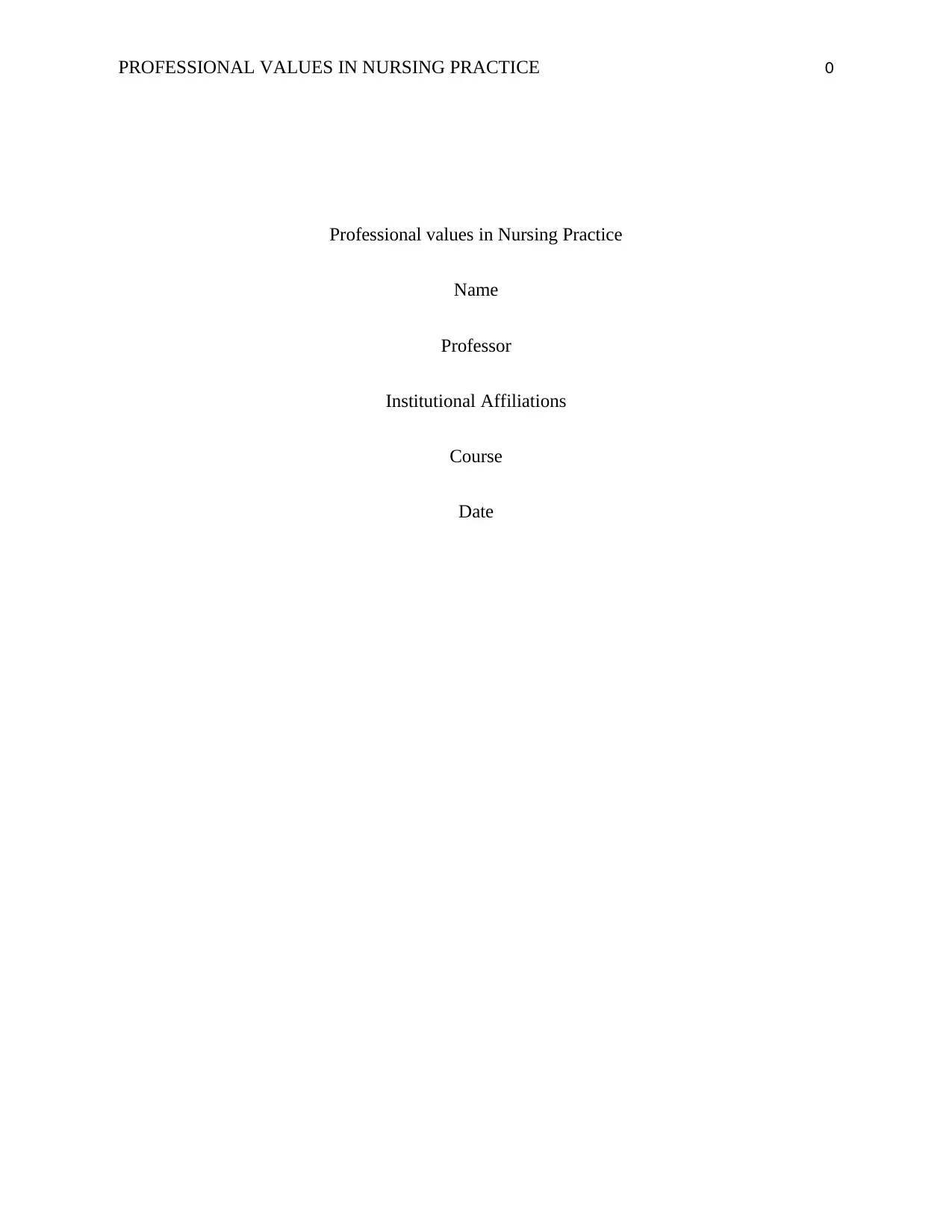
PROFESSIONAL VALUES IN NURSING PRACTICE 0
Professional values in Nursing Practice
Name
Professor
Institutional Affiliations
Course
Date
Professional values in Nursing Practice
Name
Professor
Institutional Affiliations
Course
Date
Paraphrase This Document
Need a fresh take? Get an instant paraphrase of this document with our AI Paraphraser
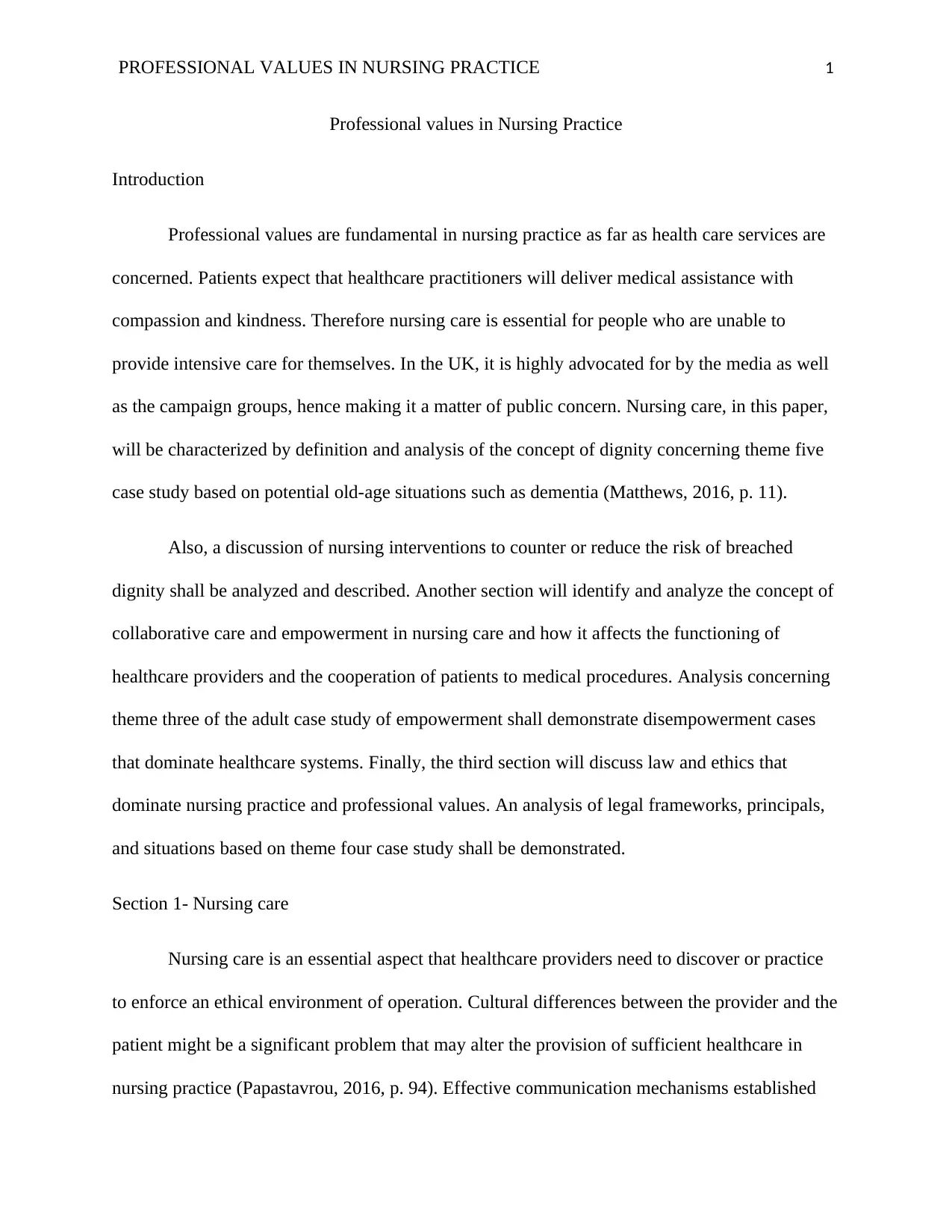
PROFESSIONAL VALUES IN NURSING PRACTICE 1
Professional values in Nursing Practice
Introduction
Professional values are fundamental in nursing practice as far as health care services are
concerned. Patients expect that healthcare practitioners will deliver medical assistance with
compassion and kindness. Therefore nursing care is essential for people who are unable to
provide intensive care for themselves. In the UK, it is highly advocated for by the media as well
as the campaign groups, hence making it a matter of public concern. Nursing care, in this paper,
will be characterized by definition and analysis of the concept of dignity concerning theme five
case study based on potential old-age situations such as dementia (Matthews, 2016, p. 11).
Also, a discussion of nursing interventions to counter or reduce the risk of breached
dignity shall be analyzed and described. Another section will identify and analyze the concept of
collaborative care and empowerment in nursing care and how it affects the functioning of
healthcare providers and the cooperation of patients to medical procedures. Analysis concerning
theme three of the adult case study of empowerment shall demonstrate disempowerment cases
that dominate healthcare systems. Finally, the third section will discuss law and ethics that
dominate nursing practice and professional values. An analysis of legal frameworks, principals,
and situations based on theme four case study shall be demonstrated.
Section 1- Nursing care
Nursing care is an essential aspect that healthcare providers need to discover or practice
to enforce an ethical environment of operation. Cultural differences between the provider and the
patient might be a significant problem that may alter the provision of sufficient healthcare in
nursing practice (Papastavrou, 2016, p. 94). Effective communication mechanisms established
Professional values in Nursing Practice
Introduction
Professional values are fundamental in nursing practice as far as health care services are
concerned. Patients expect that healthcare practitioners will deliver medical assistance with
compassion and kindness. Therefore nursing care is essential for people who are unable to
provide intensive care for themselves. In the UK, it is highly advocated for by the media as well
as the campaign groups, hence making it a matter of public concern. Nursing care, in this paper,
will be characterized by definition and analysis of the concept of dignity concerning theme five
case study based on potential old-age situations such as dementia (Matthews, 2016, p. 11).
Also, a discussion of nursing interventions to counter or reduce the risk of breached
dignity shall be analyzed and described. Another section will identify and analyze the concept of
collaborative care and empowerment in nursing care and how it affects the functioning of
healthcare providers and the cooperation of patients to medical procedures. Analysis concerning
theme three of the adult case study of empowerment shall demonstrate disempowerment cases
that dominate healthcare systems. Finally, the third section will discuss law and ethics that
dominate nursing practice and professional values. An analysis of legal frameworks, principals,
and situations based on theme four case study shall be demonstrated.
Section 1- Nursing care
Nursing care is an essential aspect that healthcare providers need to discover or practice
to enforce an ethical environment of operation. Cultural differences between the provider and the
patient might be a significant problem that may alter the provision of sufficient healthcare in
nursing practice (Papastavrou, 2016, p. 94). Effective communication mechanisms established
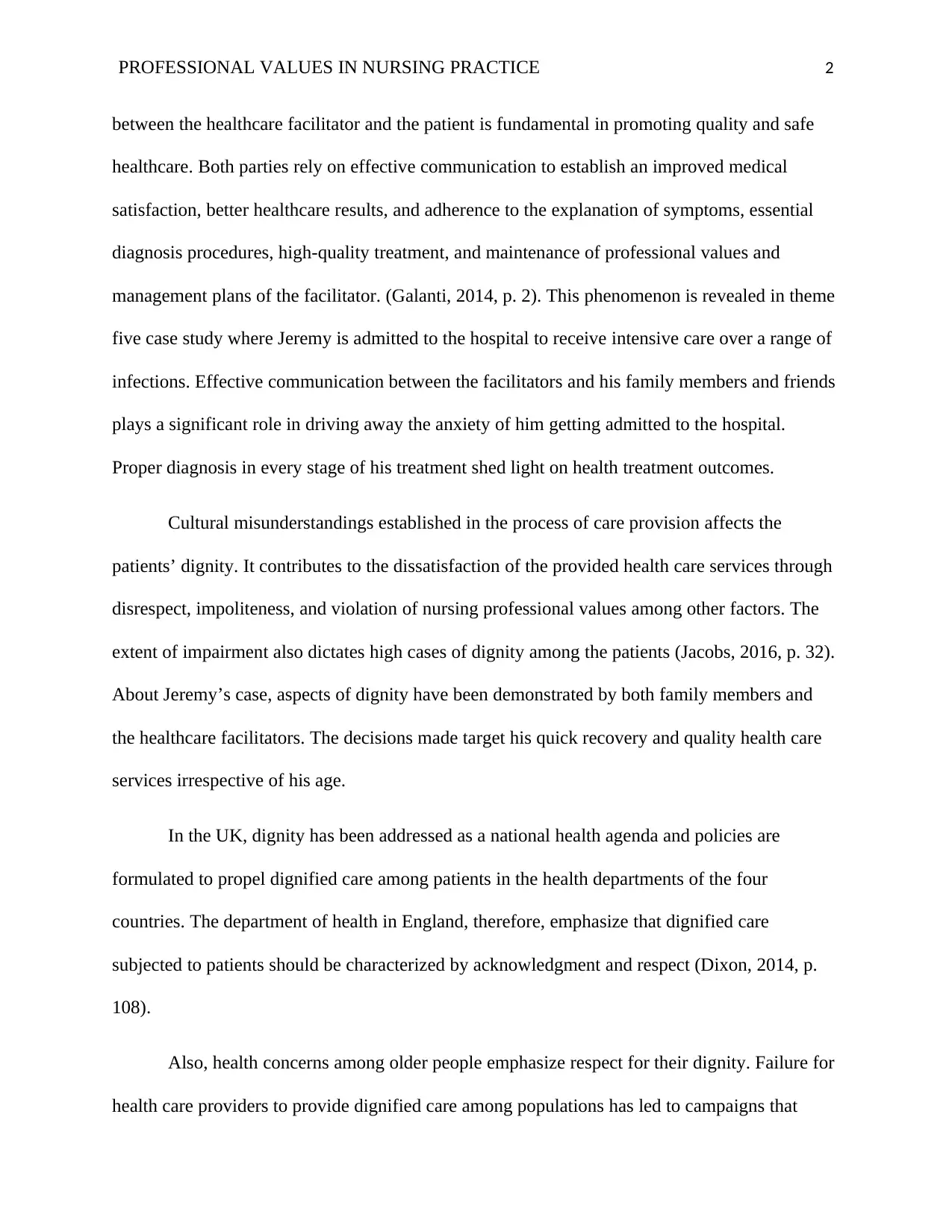
PROFESSIONAL VALUES IN NURSING PRACTICE 2
between the healthcare facilitator and the patient is fundamental in promoting quality and safe
healthcare. Both parties rely on effective communication to establish an improved medical
satisfaction, better healthcare results, and adherence to the explanation of symptoms, essential
diagnosis procedures, high-quality treatment, and maintenance of professional values and
management plans of the facilitator. (Galanti, 2014, p. 2). This phenomenon is revealed in theme
five case study where Jeremy is admitted to the hospital to receive intensive care over a range of
infections. Effective communication between the facilitators and his family members and friends
plays a significant role in driving away the anxiety of him getting admitted to the hospital.
Proper diagnosis in every stage of his treatment shed light on health treatment outcomes.
Cultural misunderstandings established in the process of care provision affects the
patients’ dignity. It contributes to the dissatisfaction of the provided health care services through
disrespect, impoliteness, and violation of nursing professional values among other factors. The
extent of impairment also dictates high cases of dignity among the patients (Jacobs, 2016, p. 32).
About Jeremy’s case, aspects of dignity have been demonstrated by both family members and
the healthcare facilitators. The decisions made target his quick recovery and quality health care
services irrespective of his age.
In the UK, dignity has been addressed as a national health agenda and policies are
formulated to propel dignified care among patients in the health departments of the four
countries. The department of health in England, therefore, emphasize that dignified care
subjected to patients should be characterized by acknowledgment and respect (Dixon, 2014, p.
108).
Also, health concerns among older people emphasize respect for their dignity. Failure for
health care providers to provide dignified care among populations has led to campaigns that
between the healthcare facilitator and the patient is fundamental in promoting quality and safe
healthcare. Both parties rely on effective communication to establish an improved medical
satisfaction, better healthcare results, and adherence to the explanation of symptoms, essential
diagnosis procedures, high-quality treatment, and maintenance of professional values and
management plans of the facilitator. (Galanti, 2014, p. 2). This phenomenon is revealed in theme
five case study where Jeremy is admitted to the hospital to receive intensive care over a range of
infections. Effective communication between the facilitators and his family members and friends
plays a significant role in driving away the anxiety of him getting admitted to the hospital.
Proper diagnosis in every stage of his treatment shed light on health treatment outcomes.
Cultural misunderstandings established in the process of care provision affects the
patients’ dignity. It contributes to the dissatisfaction of the provided health care services through
disrespect, impoliteness, and violation of nursing professional values among other factors. The
extent of impairment also dictates high cases of dignity among the patients (Jacobs, 2016, p. 32).
About Jeremy’s case, aspects of dignity have been demonstrated by both family members and
the healthcare facilitators. The decisions made target his quick recovery and quality health care
services irrespective of his age.
In the UK, dignity has been addressed as a national health agenda and policies are
formulated to propel dignified care among patients in the health departments of the four
countries. The department of health in England, therefore, emphasize that dignified care
subjected to patients should be characterized by acknowledgment and respect (Dixon, 2014, p.
108).
Also, health concerns among older people emphasize respect for their dignity. Failure for
health care providers to provide dignified care among populations has led to campaigns that
⊘ This is a preview!⊘
Do you want full access?
Subscribe today to unlock all pages.

Trusted by 1+ million students worldwide
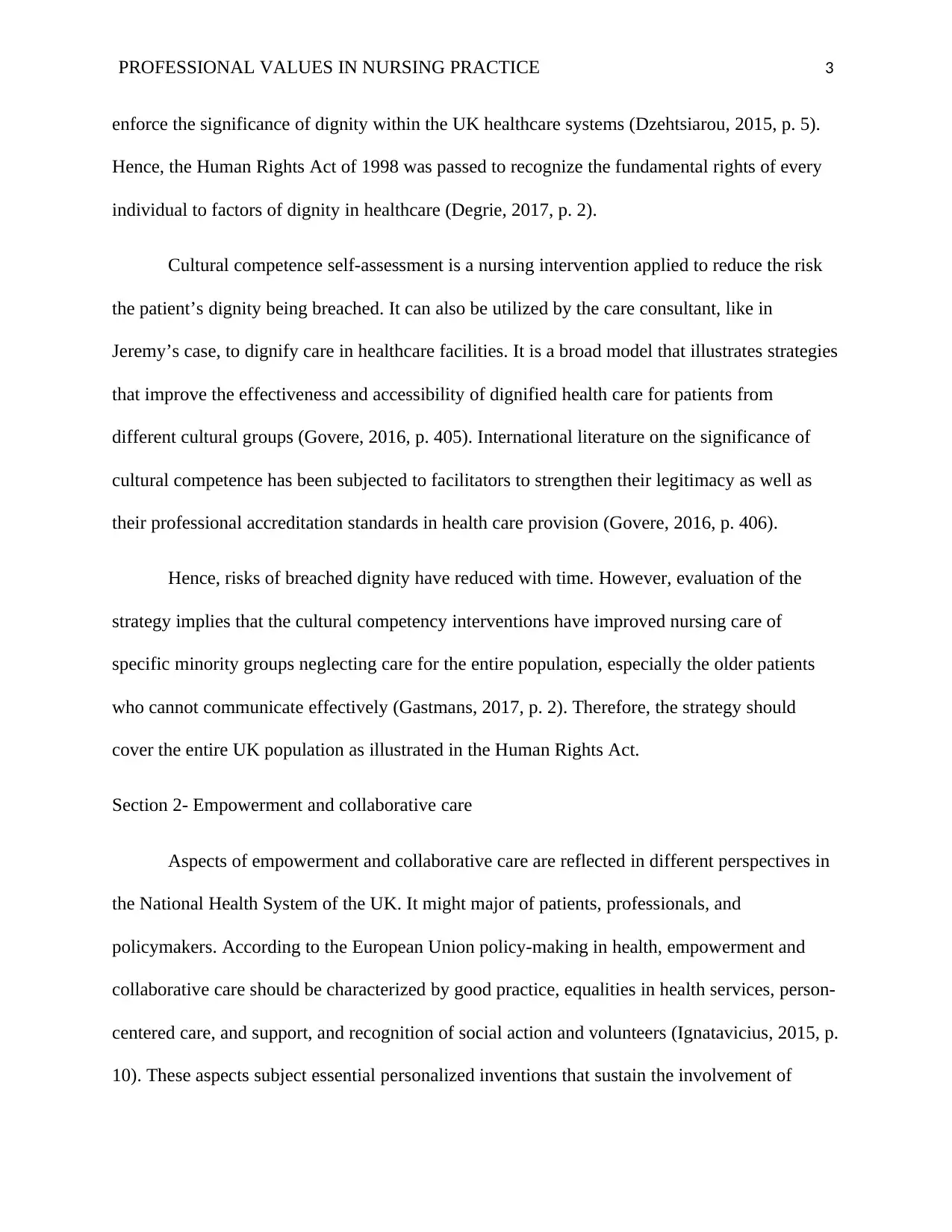
PROFESSIONAL VALUES IN NURSING PRACTICE 3
enforce the significance of dignity within the UK healthcare systems (Dzehtsiarou, 2015, p. 5).
Hence, the Human Rights Act of 1998 was passed to recognize the fundamental rights of every
individual to factors of dignity in healthcare (Degrie, 2017, p. 2).
Cultural competence self-assessment is a nursing intervention applied to reduce the risk
the patient’s dignity being breached. It can also be utilized by the care consultant, like in
Jeremy’s case, to dignify care in healthcare facilities. It is a broad model that illustrates strategies
that improve the effectiveness and accessibility of dignified health care for patients from
different cultural groups (Govere, 2016, p. 405). International literature on the significance of
cultural competence has been subjected to facilitators to strengthen their legitimacy as well as
their professional accreditation standards in health care provision (Govere, 2016, p. 406).
Hence, risks of breached dignity have reduced with time. However, evaluation of the
strategy implies that the cultural competency interventions have improved nursing care of
specific minority groups neglecting care for the entire population, especially the older patients
who cannot communicate effectively (Gastmans, 2017, p. 2). Therefore, the strategy should
cover the entire UK population as illustrated in the Human Rights Act.
Section 2- Empowerment and collaborative care
Aspects of empowerment and collaborative care are reflected in different perspectives in
the National Health System of the UK. It might major of patients, professionals, and
policymakers. According to the European Union policy-making in health, empowerment and
collaborative care should be characterized by good practice, equalities in health services, person-
centered care, and support, and recognition of social action and volunteers (Ignatavicius, 2015, p.
10). These aspects subject essential personalized inventions that sustain the involvement of
enforce the significance of dignity within the UK healthcare systems (Dzehtsiarou, 2015, p. 5).
Hence, the Human Rights Act of 1998 was passed to recognize the fundamental rights of every
individual to factors of dignity in healthcare (Degrie, 2017, p. 2).
Cultural competence self-assessment is a nursing intervention applied to reduce the risk
the patient’s dignity being breached. It can also be utilized by the care consultant, like in
Jeremy’s case, to dignify care in healthcare facilities. It is a broad model that illustrates strategies
that improve the effectiveness and accessibility of dignified health care for patients from
different cultural groups (Govere, 2016, p. 405). International literature on the significance of
cultural competence has been subjected to facilitators to strengthen their legitimacy as well as
their professional accreditation standards in health care provision (Govere, 2016, p. 406).
Hence, risks of breached dignity have reduced with time. However, evaluation of the
strategy implies that the cultural competency interventions have improved nursing care of
specific minority groups neglecting care for the entire population, especially the older patients
who cannot communicate effectively (Gastmans, 2017, p. 2). Therefore, the strategy should
cover the entire UK population as illustrated in the Human Rights Act.
Section 2- Empowerment and collaborative care
Aspects of empowerment and collaborative care are reflected in different perspectives in
the National Health System of the UK. It might major of patients, professionals, and
policymakers. According to the European Union policy-making in health, empowerment and
collaborative care should be characterized by good practice, equalities in health services, person-
centered care, and support, and recognition of social action and volunteers (Ignatavicius, 2015, p.
10). These aspects subject essential personalized inventions that sustain the involvement of
Paraphrase This Document
Need a fresh take? Get an instant paraphrase of this document with our AI Paraphraser
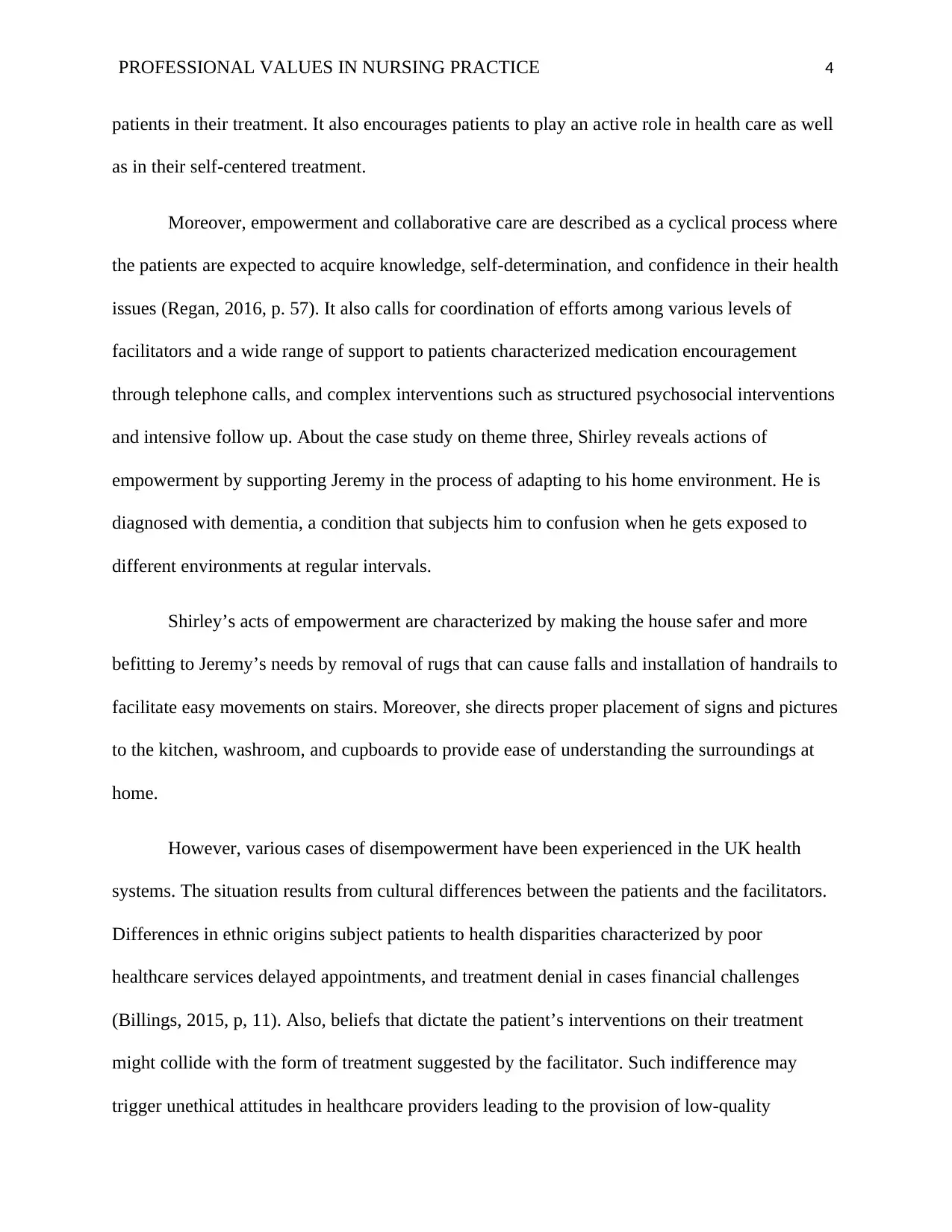
PROFESSIONAL VALUES IN NURSING PRACTICE 4
patients in their treatment. It also encourages patients to play an active role in health care as well
as in their self-centered treatment.
Moreover, empowerment and collaborative care are described as a cyclical process where
the patients are expected to acquire knowledge, self-determination, and confidence in their health
issues (Regan, 2016, p. 57). It also calls for coordination of efforts among various levels of
facilitators and a wide range of support to patients characterized medication encouragement
through telephone calls, and complex interventions such as structured psychosocial interventions
and intensive follow up. About the case study on theme three, Shirley reveals actions of
empowerment by supporting Jeremy in the process of adapting to his home environment. He is
diagnosed with dementia, a condition that subjects him to confusion when he gets exposed to
different environments at regular intervals.
Shirley’s acts of empowerment are characterized by making the house safer and more
befitting to Jeremy’s needs by removal of rugs that can cause falls and installation of handrails to
facilitate easy movements on stairs. Moreover, she directs proper placement of signs and pictures
to the kitchen, washroom, and cupboards to provide ease of understanding the surroundings at
home.
However, various cases of disempowerment have been experienced in the UK health
systems. The situation results from cultural differences between the patients and the facilitators.
Differences in ethnic origins subject patients to health disparities characterized by poor
healthcare services delayed appointments, and treatment denial in cases financial challenges
(Billings, 2015, p, 11). Also, beliefs that dictate the patient’s interventions on their treatment
might collide with the form of treatment suggested by the facilitator. Such indifference may
trigger unethical attitudes in healthcare providers leading to the provision of low-quality
patients in their treatment. It also encourages patients to play an active role in health care as well
as in their self-centered treatment.
Moreover, empowerment and collaborative care are described as a cyclical process where
the patients are expected to acquire knowledge, self-determination, and confidence in their health
issues (Regan, 2016, p. 57). It also calls for coordination of efforts among various levels of
facilitators and a wide range of support to patients characterized medication encouragement
through telephone calls, and complex interventions such as structured psychosocial interventions
and intensive follow up. About the case study on theme three, Shirley reveals actions of
empowerment by supporting Jeremy in the process of adapting to his home environment. He is
diagnosed with dementia, a condition that subjects him to confusion when he gets exposed to
different environments at regular intervals.
Shirley’s acts of empowerment are characterized by making the house safer and more
befitting to Jeremy’s needs by removal of rugs that can cause falls and installation of handrails to
facilitate easy movements on stairs. Moreover, she directs proper placement of signs and pictures
to the kitchen, washroom, and cupboards to provide ease of understanding the surroundings at
home.
However, various cases of disempowerment have been experienced in the UK health
systems. The situation results from cultural differences between the patients and the facilitators.
Differences in ethnic origins subject patients to health disparities characterized by poor
healthcare services delayed appointments, and treatment denial in cases financial challenges
(Billings, 2015, p, 11). Also, beliefs that dictate the patient’s interventions on their treatment
might collide with the form of treatment suggested by the facilitator. Such indifference may
trigger unethical attitudes in healthcare providers leading to the provision of low-quality
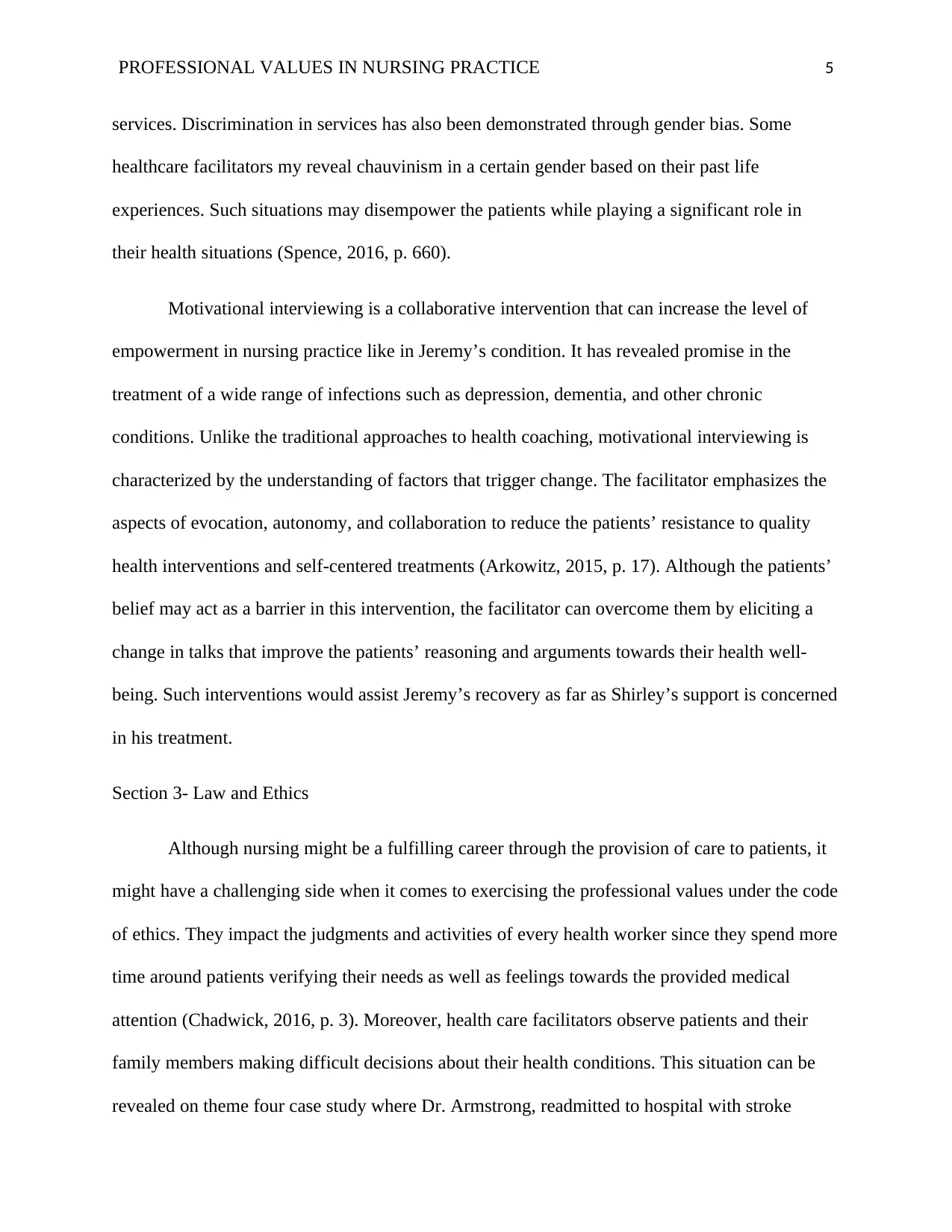
PROFESSIONAL VALUES IN NURSING PRACTICE 5
services. Discrimination in services has also been demonstrated through gender bias. Some
healthcare facilitators my reveal chauvinism in a certain gender based on their past life
experiences. Such situations may disempower the patients while playing a significant role in
their health situations (Spence, 2016, p. 660).
Motivational interviewing is a collaborative intervention that can increase the level of
empowerment in nursing practice like in Jeremy’s condition. It has revealed promise in the
treatment of a wide range of infections such as depression, dementia, and other chronic
conditions. Unlike the traditional approaches to health coaching, motivational interviewing is
characterized by the understanding of factors that trigger change. The facilitator emphasizes the
aspects of evocation, autonomy, and collaboration to reduce the patients’ resistance to quality
health interventions and self-centered treatments (Arkowitz, 2015, p. 17). Although the patients’
belief may act as a barrier in this intervention, the facilitator can overcome them by eliciting a
change in talks that improve the patients’ reasoning and arguments towards their health well-
being. Such interventions would assist Jeremy’s recovery as far as Shirley’s support is concerned
in his treatment.
Section 3- Law and Ethics
Although nursing might be a fulfilling career through the provision of care to patients, it
might have a challenging side when it comes to exercising the professional values under the code
of ethics. They impact the judgments and activities of every health worker since they spend more
time around patients verifying their needs as well as feelings towards the provided medical
attention (Chadwick, 2016, p. 3). Moreover, health care facilitators observe patients and their
family members making difficult decisions about their health conditions. This situation can be
revealed on theme four case study where Dr. Armstrong, readmitted to hospital with stroke
services. Discrimination in services has also been demonstrated through gender bias. Some
healthcare facilitators my reveal chauvinism in a certain gender based on their past life
experiences. Such situations may disempower the patients while playing a significant role in
their health situations (Spence, 2016, p. 660).
Motivational interviewing is a collaborative intervention that can increase the level of
empowerment in nursing practice like in Jeremy’s condition. It has revealed promise in the
treatment of a wide range of infections such as depression, dementia, and other chronic
conditions. Unlike the traditional approaches to health coaching, motivational interviewing is
characterized by the understanding of factors that trigger change. The facilitator emphasizes the
aspects of evocation, autonomy, and collaboration to reduce the patients’ resistance to quality
health interventions and self-centered treatments (Arkowitz, 2015, p. 17). Although the patients’
belief may act as a barrier in this intervention, the facilitator can overcome them by eliciting a
change in talks that improve the patients’ reasoning and arguments towards their health well-
being. Such interventions would assist Jeremy’s recovery as far as Shirley’s support is concerned
in his treatment.
Section 3- Law and Ethics
Although nursing might be a fulfilling career through the provision of care to patients, it
might have a challenging side when it comes to exercising the professional values under the code
of ethics. They impact the judgments and activities of every health worker since they spend more
time around patients verifying their needs as well as feelings towards the provided medical
attention (Chadwick, 2016, p. 3). Moreover, health care facilitators observe patients and their
family members making difficult decisions about their health conditions. This situation can be
revealed on theme four case study where Dr. Armstrong, readmitted to hospital with stroke
⊘ This is a preview!⊘
Do you want full access?
Subscribe today to unlock all pages.

Trusted by 1+ million students worldwide
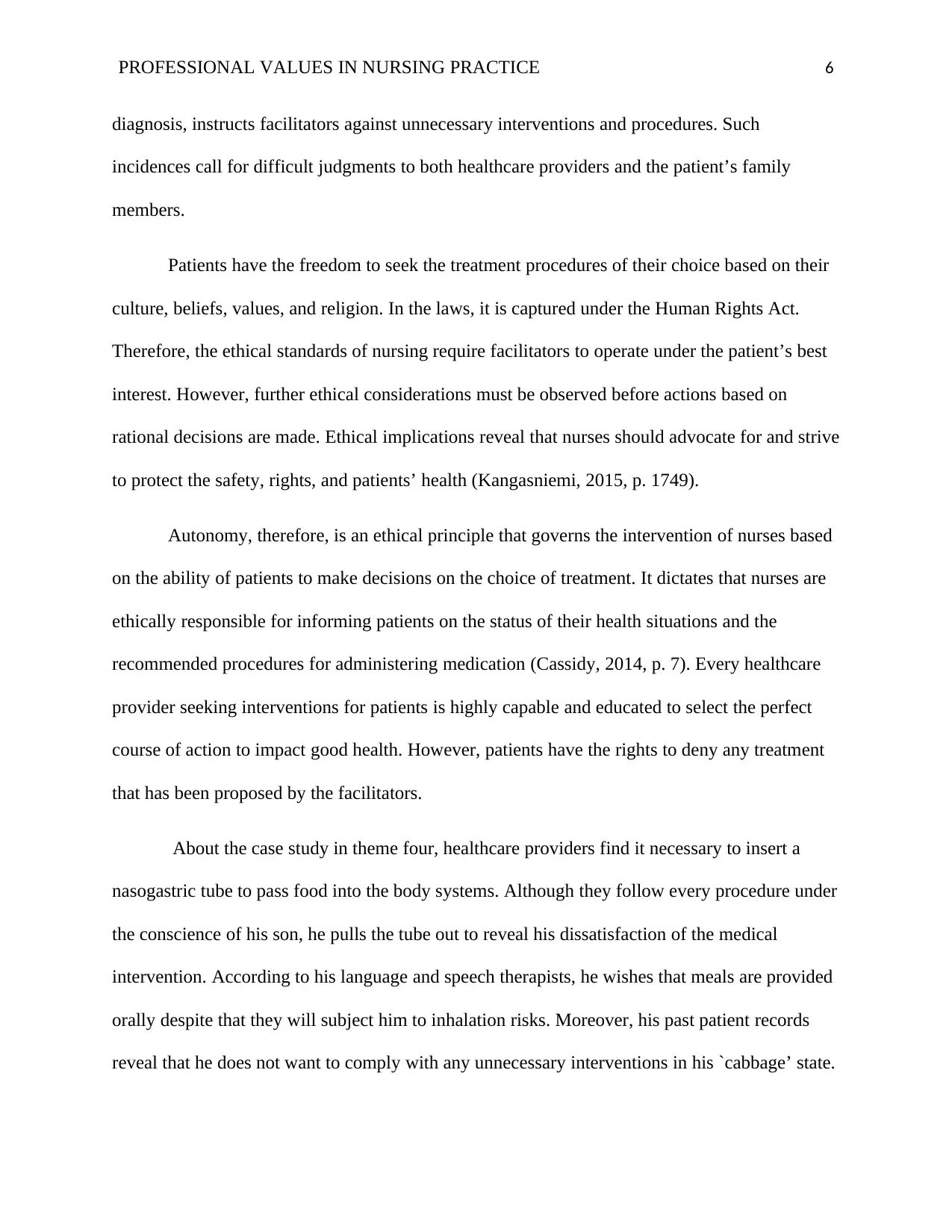
PROFESSIONAL VALUES IN NURSING PRACTICE 6
diagnosis, instructs facilitators against unnecessary interventions and procedures. Such
incidences call for difficult judgments to both healthcare providers and the patient’s family
members.
Patients have the freedom to seek the treatment procedures of their choice based on their
culture, beliefs, values, and religion. In the laws, it is captured under the Human Rights Act.
Therefore, the ethical standards of nursing require facilitators to operate under the patient’s best
interest. However, further ethical considerations must be observed before actions based on
rational decisions are made. Ethical implications reveal that nurses should advocate for and strive
to protect the safety, rights, and patients’ health (Kangasniemi, 2015, p. 1749).
Autonomy, therefore, is an ethical principle that governs the intervention of nurses based
on the ability of patients to make decisions on the choice of treatment. It dictates that nurses are
ethically responsible for informing patients on the status of their health situations and the
recommended procedures for administering medication (Cassidy, 2014, p. 7). Every healthcare
provider seeking interventions for patients is highly capable and educated to select the perfect
course of action to impact good health. However, patients have the rights to deny any treatment
that has been proposed by the facilitators.
About the case study in theme four, healthcare providers find it necessary to insert a
nasogastric tube to pass food into the body systems. Although they follow every procedure under
the conscience of his son, he pulls the tube out to reveal his dissatisfaction of the medical
intervention. According to his language and speech therapists, he wishes that meals are provided
orally despite that they will subject him to inhalation risks. Moreover, his past patient records
reveal that he does not want to comply with any unnecessary interventions in his `cabbage’ state.
diagnosis, instructs facilitators against unnecessary interventions and procedures. Such
incidences call for difficult judgments to both healthcare providers and the patient’s family
members.
Patients have the freedom to seek the treatment procedures of their choice based on their
culture, beliefs, values, and religion. In the laws, it is captured under the Human Rights Act.
Therefore, the ethical standards of nursing require facilitators to operate under the patient’s best
interest. However, further ethical considerations must be observed before actions based on
rational decisions are made. Ethical implications reveal that nurses should advocate for and strive
to protect the safety, rights, and patients’ health (Kangasniemi, 2015, p. 1749).
Autonomy, therefore, is an ethical principle that governs the intervention of nurses based
on the ability of patients to make decisions on the choice of treatment. It dictates that nurses are
ethically responsible for informing patients on the status of their health situations and the
recommended procedures for administering medication (Cassidy, 2014, p. 7). Every healthcare
provider seeking interventions for patients is highly capable and educated to select the perfect
course of action to impact good health. However, patients have the rights to deny any treatment
that has been proposed by the facilitators.
About the case study in theme four, healthcare providers find it necessary to insert a
nasogastric tube to pass food into the body systems. Although they follow every procedure under
the conscience of his son, he pulls the tube out to reveal his dissatisfaction of the medical
intervention. According to his language and speech therapists, he wishes that meals are provided
orally despite that they will subject him to inhalation risks. Moreover, his past patient records
reveal that he does not want to comply with any unnecessary interventions in his `cabbage’ state.
Paraphrase This Document
Need a fresh take? Get an instant paraphrase of this document with our AI Paraphraser
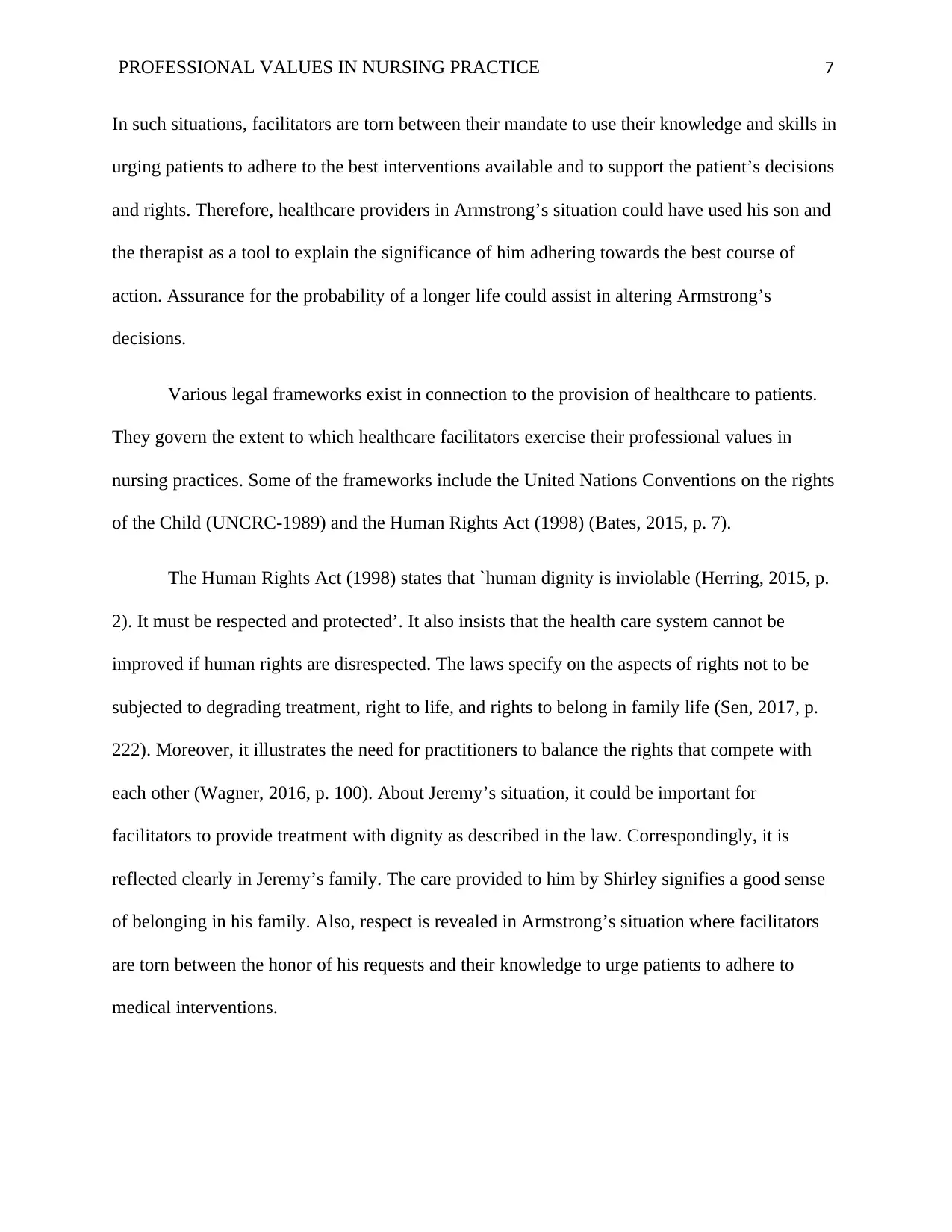
PROFESSIONAL VALUES IN NURSING PRACTICE 7
In such situations, facilitators are torn between their mandate to use their knowledge and skills in
urging patients to adhere to the best interventions available and to support the patient’s decisions
and rights. Therefore, healthcare providers in Armstrong’s situation could have used his son and
the therapist as a tool to explain the significance of him adhering towards the best course of
action. Assurance for the probability of a longer life could assist in altering Armstrong’s
decisions.
Various legal frameworks exist in connection to the provision of healthcare to patients.
They govern the extent to which healthcare facilitators exercise their professional values in
nursing practices. Some of the frameworks include the United Nations Conventions on the rights
of the Child (UNCRC-1989) and the Human Rights Act (1998) (Bates, 2015, p. 7).
The Human Rights Act (1998) states that `human dignity is inviolable (Herring, 2015, p.
2). It must be respected and protected’. It also insists that the health care system cannot be
improved if human rights are disrespected. The laws specify on the aspects of rights not to be
subjected to degrading treatment, right to life, and rights to belong in family life (Sen, 2017, p.
222). Moreover, it illustrates the need for practitioners to balance the rights that compete with
each other (Wagner, 2016, p. 100). About Jeremy’s situation, it could be important for
facilitators to provide treatment with dignity as described in the law. Correspondingly, it is
reflected clearly in Jeremy’s family. The care provided to him by Shirley signifies a good sense
of belonging in his family. Also, respect is revealed in Armstrong’s situation where facilitators
are torn between the honor of his requests and their knowledge to urge patients to adhere to
medical interventions.
In such situations, facilitators are torn between their mandate to use their knowledge and skills in
urging patients to adhere to the best interventions available and to support the patient’s decisions
and rights. Therefore, healthcare providers in Armstrong’s situation could have used his son and
the therapist as a tool to explain the significance of him adhering towards the best course of
action. Assurance for the probability of a longer life could assist in altering Armstrong’s
decisions.
Various legal frameworks exist in connection to the provision of healthcare to patients.
They govern the extent to which healthcare facilitators exercise their professional values in
nursing practices. Some of the frameworks include the United Nations Conventions on the rights
of the Child (UNCRC-1989) and the Human Rights Act (1998) (Bates, 2015, p. 7).
The Human Rights Act (1998) states that `human dignity is inviolable (Herring, 2015, p.
2). It must be respected and protected’. It also insists that the health care system cannot be
improved if human rights are disrespected. The laws specify on the aspects of rights not to be
subjected to degrading treatment, right to life, and rights to belong in family life (Sen, 2017, p.
222). Moreover, it illustrates the need for practitioners to balance the rights that compete with
each other (Wagner, 2016, p. 100). About Jeremy’s situation, it could be important for
facilitators to provide treatment with dignity as described in the law. Correspondingly, it is
reflected clearly in Jeremy’s family. The care provided to him by Shirley signifies a good sense
of belonging in his family. Also, respect is revealed in Armstrong’s situation where facilitators
are torn between the honor of his requests and their knowledge to urge patients to adhere to
medical interventions.
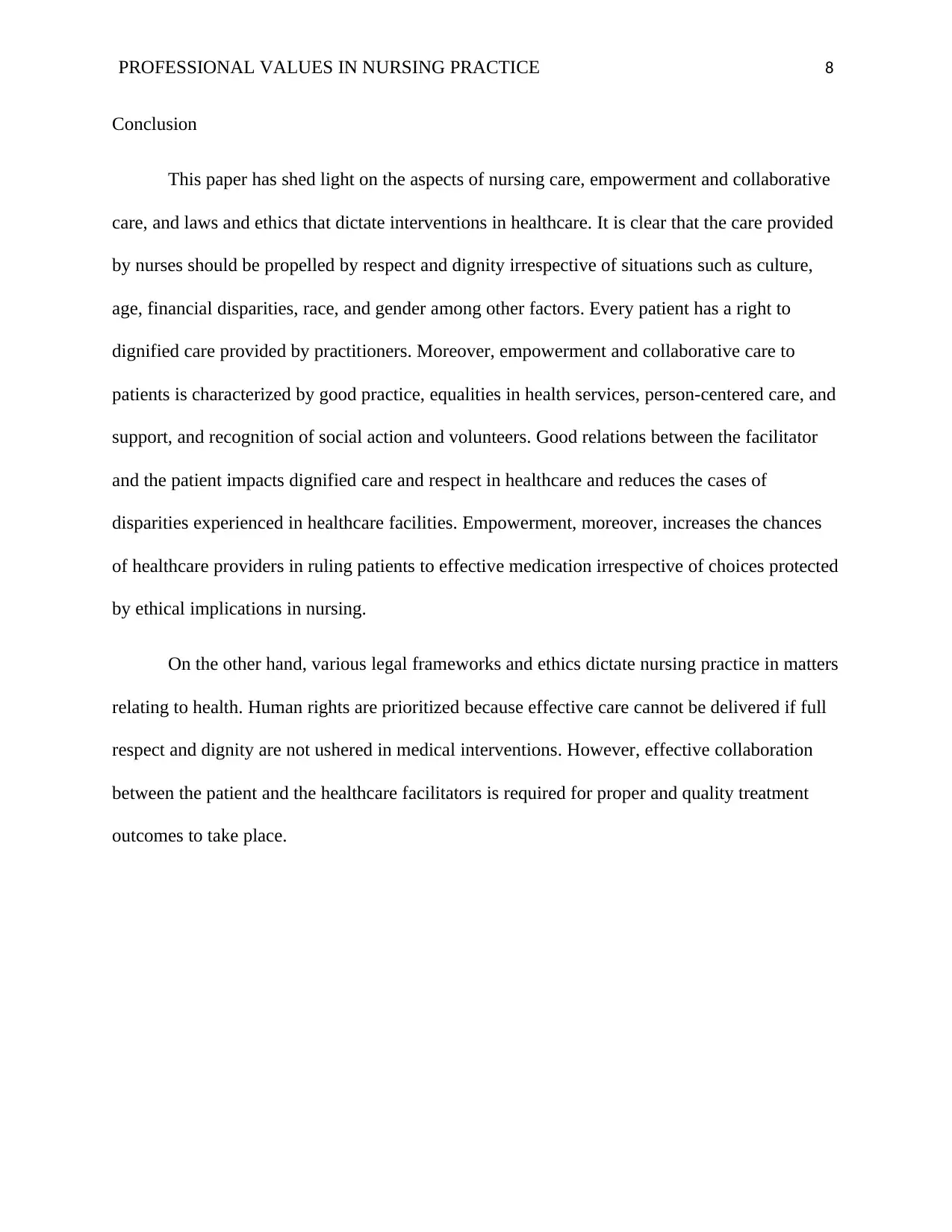
PROFESSIONAL VALUES IN NURSING PRACTICE 8
Conclusion
This paper has shed light on the aspects of nursing care, empowerment and collaborative
care, and laws and ethics that dictate interventions in healthcare. It is clear that the care provided
by nurses should be propelled by respect and dignity irrespective of situations such as culture,
age, financial disparities, race, and gender among other factors. Every patient has a right to
dignified care provided by practitioners. Moreover, empowerment and collaborative care to
patients is characterized by good practice, equalities in health services, person-centered care, and
support, and recognition of social action and volunteers. Good relations between the facilitator
and the patient impacts dignified care and respect in healthcare and reduces the cases of
disparities experienced in healthcare facilities. Empowerment, moreover, increases the chances
of healthcare providers in ruling patients to effective medication irrespective of choices protected
by ethical implications in nursing.
On the other hand, various legal frameworks and ethics dictate nursing practice in matters
relating to health. Human rights are prioritized because effective care cannot be delivered if full
respect and dignity are not ushered in medical interventions. However, effective collaboration
between the patient and the healthcare facilitators is required for proper and quality treatment
outcomes to take place.
Conclusion
This paper has shed light on the aspects of nursing care, empowerment and collaborative
care, and laws and ethics that dictate interventions in healthcare. It is clear that the care provided
by nurses should be propelled by respect and dignity irrespective of situations such as culture,
age, financial disparities, race, and gender among other factors. Every patient has a right to
dignified care provided by practitioners. Moreover, empowerment and collaborative care to
patients is characterized by good practice, equalities in health services, person-centered care, and
support, and recognition of social action and volunteers. Good relations between the facilitator
and the patient impacts dignified care and respect in healthcare and reduces the cases of
disparities experienced in healthcare facilities. Empowerment, moreover, increases the chances
of healthcare providers in ruling patients to effective medication irrespective of choices protected
by ethical implications in nursing.
On the other hand, various legal frameworks and ethics dictate nursing practice in matters
relating to health. Human rights are prioritized because effective care cannot be delivered if full
respect and dignity are not ushered in medical interventions. However, effective collaboration
between the patient and the healthcare facilitators is required for proper and quality treatment
outcomes to take place.
⊘ This is a preview!⊘
Do you want full access?
Subscribe today to unlock all pages.

Trusted by 1+ million students worldwide
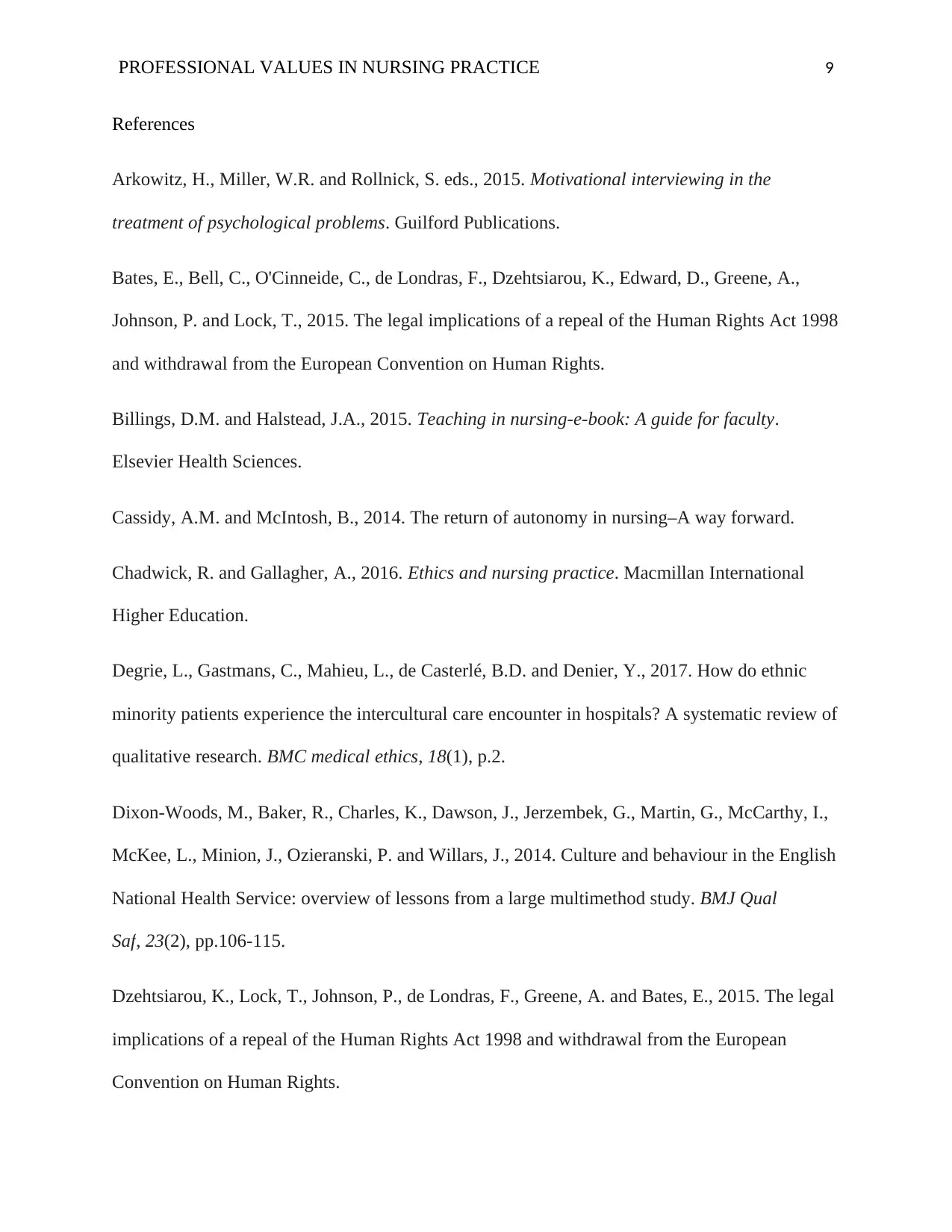
PROFESSIONAL VALUES IN NURSING PRACTICE 9
References
Arkowitz, H., Miller, W.R. and Rollnick, S. eds., 2015. Motivational interviewing in the
treatment of psychological problems. Guilford Publications.
Bates, E., Bell, C., O'Cinneide, C., de Londras, F., Dzehtsiarou, K., Edward, D., Greene, A.,
Johnson, P. and Lock, T., 2015. The legal implications of a repeal of the Human Rights Act 1998
and withdrawal from the European Convention on Human Rights.
Billings, D.M. and Halstead, J.A., 2015. Teaching in nursing-e-book: A guide for faculty.
Elsevier Health Sciences.
Cassidy, A.M. and McIntosh, B., 2014. The return of autonomy in nursing–A way forward.
Chadwick, R. and Gallagher, A., 2016. Ethics and nursing practice. Macmillan International
Higher Education.
Degrie, L., Gastmans, C., Mahieu, L., de Casterlé, B.D. and Denier, Y., 2017. How do ethnic
minority patients experience the intercultural care encounter in hospitals? A systematic review of
qualitative research. BMC medical ethics, 18(1), p.2.
Dixon-Woods, M., Baker, R., Charles, K., Dawson, J., Jerzembek, G., Martin, G., McCarthy, I.,
McKee, L., Minion, J., Ozieranski, P. and Willars, J., 2014. Culture and behaviour in the English
National Health Service: overview of lessons from a large multimethod study. BMJ Qual
Saf, 23(2), pp.106-115.
Dzehtsiarou, K., Lock, T., Johnson, P., de Londras, F., Greene, A. and Bates, E., 2015. The legal
implications of a repeal of the Human Rights Act 1998 and withdrawal from the European
Convention on Human Rights.
References
Arkowitz, H., Miller, W.R. and Rollnick, S. eds., 2015. Motivational interviewing in the
treatment of psychological problems. Guilford Publications.
Bates, E., Bell, C., O'Cinneide, C., de Londras, F., Dzehtsiarou, K., Edward, D., Greene, A.,
Johnson, P. and Lock, T., 2015. The legal implications of a repeal of the Human Rights Act 1998
and withdrawal from the European Convention on Human Rights.
Billings, D.M. and Halstead, J.A., 2015. Teaching in nursing-e-book: A guide for faculty.
Elsevier Health Sciences.
Cassidy, A.M. and McIntosh, B., 2014. The return of autonomy in nursing–A way forward.
Chadwick, R. and Gallagher, A., 2016. Ethics and nursing practice. Macmillan International
Higher Education.
Degrie, L., Gastmans, C., Mahieu, L., de Casterlé, B.D. and Denier, Y., 2017. How do ethnic
minority patients experience the intercultural care encounter in hospitals? A systematic review of
qualitative research. BMC medical ethics, 18(1), p.2.
Dixon-Woods, M., Baker, R., Charles, K., Dawson, J., Jerzembek, G., Martin, G., McCarthy, I.,
McKee, L., Minion, J., Ozieranski, P. and Willars, J., 2014. Culture and behaviour in the English
National Health Service: overview of lessons from a large multimethod study. BMJ Qual
Saf, 23(2), pp.106-115.
Dzehtsiarou, K., Lock, T., Johnson, P., de Londras, F., Greene, A. and Bates, E., 2015. The legal
implications of a repeal of the Human Rights Act 1998 and withdrawal from the European
Convention on Human Rights.
Paraphrase This Document
Need a fresh take? Get an instant paraphrase of this document with our AI Paraphraser
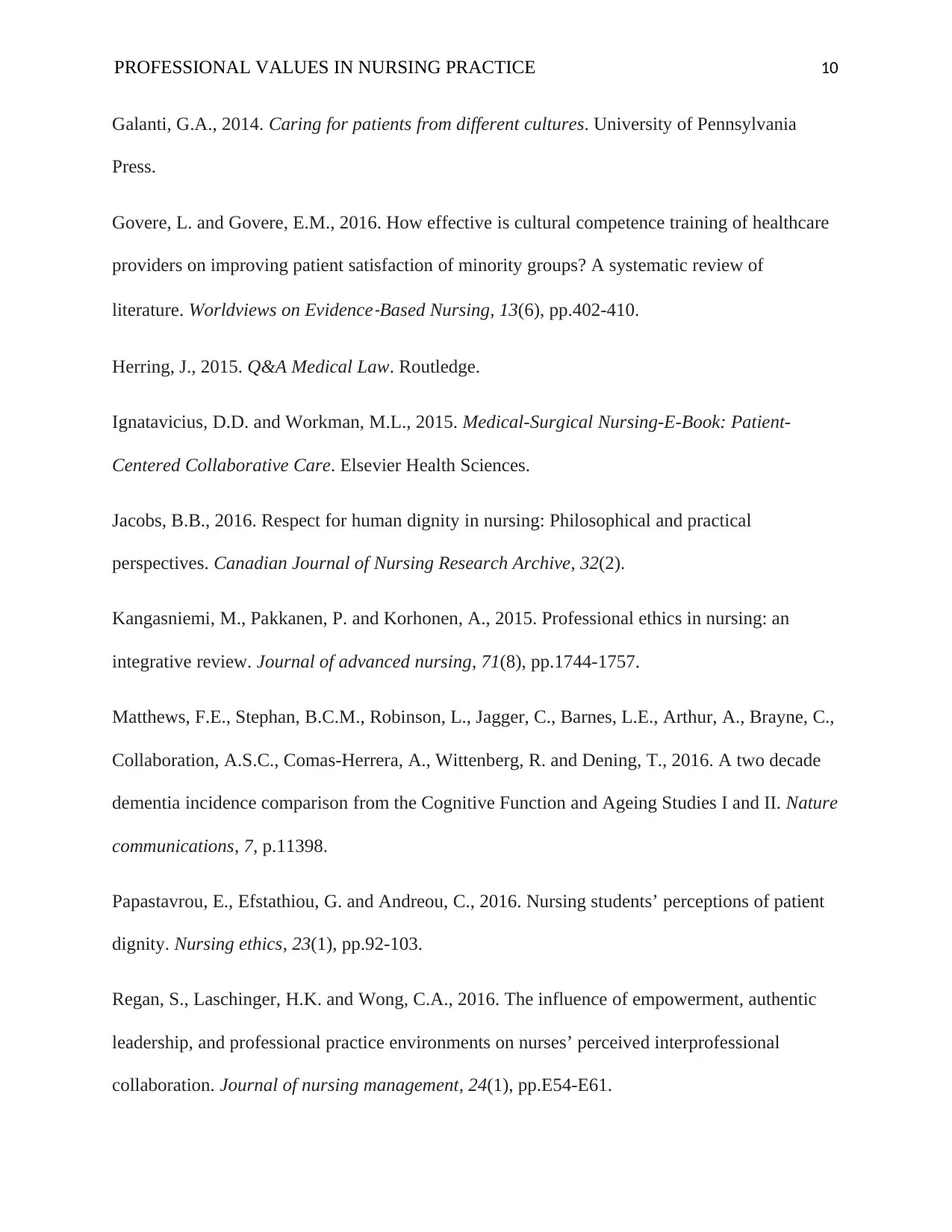
PROFESSIONAL VALUES IN NURSING PRACTICE 10
Galanti, G.A., 2014. Caring for patients from different cultures. University of Pennsylvania
Press.
Govere, L. and Govere, E.M., 2016. How effective is cultural competence training of healthcare
providers on improving patient satisfaction of minority groups? A systematic review of
literature. Worldviews on Evidence
‐Based Nursing, 13(6), pp.402-410.
Herring, J., 2015. Q&A Medical Law. Routledge.
Ignatavicius, D.D. and Workman, M.L., 2015. Medical-Surgical Nursing-E-Book: Patient-
Centered Collaborative Care. Elsevier Health Sciences.
Jacobs, B.B., 2016. Respect for human dignity in nursing: Philosophical and practical
perspectives. Canadian Journal of Nursing Research Archive, 32(2).
Kangasniemi, M., Pakkanen, P. and Korhonen, A., 2015. Professional ethics in nursing: an
integrative review. Journal of advanced nursing, 71(8), pp.1744-1757.
Matthews, F.E., Stephan, B.C.M., Robinson, L., Jagger, C., Barnes, L.E., Arthur, A., Brayne, C.,
Collaboration, A.S.C., Comas-Herrera, A., Wittenberg, R. and Dening, T., 2016. A two decade
dementia incidence comparison from the Cognitive Function and Ageing Studies I and II. Nature
communications, 7, p.11398.
Papastavrou, E., Efstathiou, G. and Andreou, C., 2016. Nursing students’ perceptions of patient
dignity. Nursing ethics, 23(1), pp.92-103.
Regan, S., Laschinger, H.K. and Wong, C.A., 2016. The influence of empowerment, authentic
leadership, and professional practice environments on nurses’ perceived interprofessional
collaboration. Journal of nursing management, 24(1), pp.E54-E61.
Galanti, G.A., 2014. Caring for patients from different cultures. University of Pennsylvania
Press.
Govere, L. and Govere, E.M., 2016. How effective is cultural competence training of healthcare
providers on improving patient satisfaction of minority groups? A systematic review of
literature. Worldviews on Evidence
‐Based Nursing, 13(6), pp.402-410.
Herring, J., 2015. Q&A Medical Law. Routledge.
Ignatavicius, D.D. and Workman, M.L., 2015. Medical-Surgical Nursing-E-Book: Patient-
Centered Collaborative Care. Elsevier Health Sciences.
Jacobs, B.B., 2016. Respect for human dignity in nursing: Philosophical and practical
perspectives. Canadian Journal of Nursing Research Archive, 32(2).
Kangasniemi, M., Pakkanen, P. and Korhonen, A., 2015. Professional ethics in nursing: an
integrative review. Journal of advanced nursing, 71(8), pp.1744-1757.
Matthews, F.E., Stephan, B.C.M., Robinson, L., Jagger, C., Barnes, L.E., Arthur, A., Brayne, C.,
Collaboration, A.S.C., Comas-Herrera, A., Wittenberg, R. and Dening, T., 2016. A two decade
dementia incidence comparison from the Cognitive Function and Ageing Studies I and II. Nature
communications, 7, p.11398.
Papastavrou, E., Efstathiou, G. and Andreou, C., 2016. Nursing students’ perceptions of patient
dignity. Nursing ethics, 23(1), pp.92-103.
Regan, S., Laschinger, H.K. and Wong, C.A., 2016. The influence of empowerment, authentic
leadership, and professional practice environments on nurses’ perceived interprofessional
collaboration. Journal of nursing management, 24(1), pp.E54-E61.
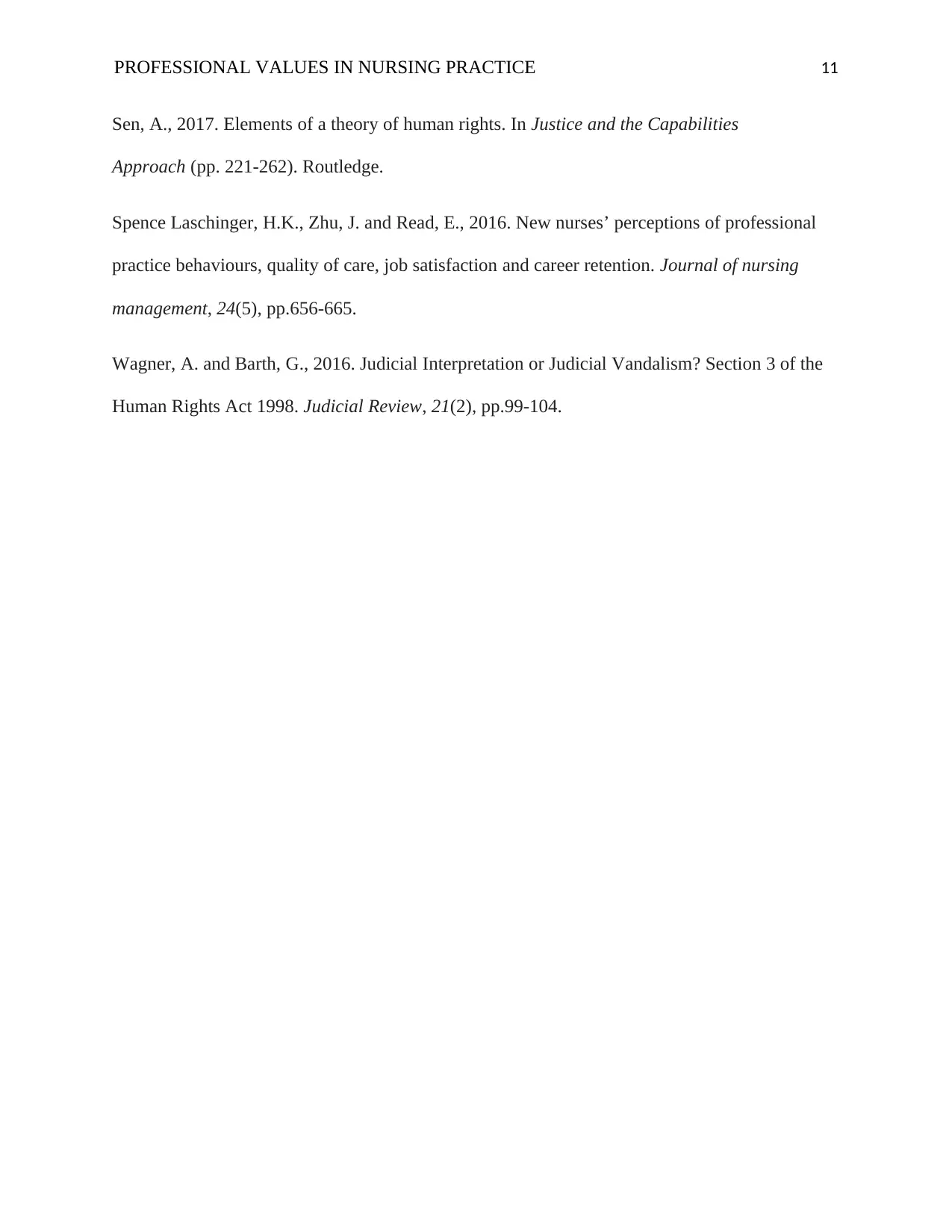
PROFESSIONAL VALUES IN NURSING PRACTICE 11
Sen, A., 2017. Elements of a theory of human rights. In Justice and the Capabilities
Approach (pp. 221-262). Routledge.
Spence Laschinger, H.K., Zhu, J. and Read, E., 2016. New nurses’ perceptions of professional
practice behaviours, quality of care, job satisfaction and career retention. Journal of nursing
management, 24(5), pp.656-665.
Wagner, A. and Barth, G., 2016. Judicial Interpretation or Judicial Vandalism? Section 3 of the
Human Rights Act 1998. Judicial Review, 21(2), pp.99-104.
Sen, A., 2017. Elements of a theory of human rights. In Justice and the Capabilities
Approach (pp. 221-262). Routledge.
Spence Laschinger, H.K., Zhu, J. and Read, E., 2016. New nurses’ perceptions of professional
practice behaviours, quality of care, job satisfaction and career retention. Journal of nursing
management, 24(5), pp.656-665.
Wagner, A. and Barth, G., 2016. Judicial Interpretation or Judicial Vandalism? Section 3 of the
Human Rights Act 1998. Judicial Review, 21(2), pp.99-104.
⊘ This is a preview!⊘
Do you want full access?
Subscribe today to unlock all pages.

Trusted by 1+ million students worldwide
1 out of 12
Related Documents
Your All-in-One AI-Powered Toolkit for Academic Success.
+13062052269
info@desklib.com
Available 24*7 on WhatsApp / Email
![[object Object]](/_next/static/media/star-bottom.7253800d.svg)
Unlock your academic potential
Copyright © 2020–2026 A2Z Services. All Rights Reserved. Developed and managed by ZUCOL.




